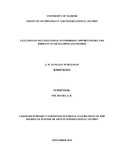| dc.description.abstract | Tax revenue is a major source of the gross national income in many developing countries. While
tax revenues in OECD-countries amount to almost 36 per cent of gross national income in 2007,
the share in selected developing regions amounts around 23% in Africa (in 2007) and 17.5%
Latin America (in 2004). The low percentage of tax revenue attributed to developing economies
is indicative of inefficient tax collection mechanisms in these countries. The current study seeks
to analyse the influence of legislative and administrative capacity of tax administrators in
developing economies to the tax compliance behaviour of the Multinational Enterprises, MNEs.
The study focuses on corporation tax revenue payable from MNE‟s. The specific objectives of
the study include: To examine the extent to which corporation tax revenue from MNE‟s is
affected by the legislative framework of the host country in selected developing countries; To
examine the extent to which corporation tax revenue from MNE‟s is affected by the
administrative capacity of the tax administrator of the host country in selected developing
countries and to assess the impact of various legitimate and illegitimate means through which tax
revenue is lost from developing countries through MNE taxation regime. The present study
utilizes the dependency theory of international relations for analysis. The dependency theory is a
Marxist analytical theory that postulates that resources flow from a “periphery” of poor and less
developed states to a "core" of wealthy states, enriching the latter at the expense of the former. It
is a central contention of dependency theory that poor states are impoverished and rich ones
enriched by the way poor states are integrated into the “world system.” The present study adopts
the research design of a survey. Surveys are concerned with describing, recording, analyzing and
interpreting conditions that either exist or existed. The researcher does not manipulate the
variable or arrange for events to happen. Surveys are only concerned with conditions or
relationships as they exist, opinions as they are held, processes as they are going on, effects as
they are evident and trends as they develop. An empirical study was conducted whereby 20 KRA
auditors were asked to give their views on certain issues related to MNE tax compliance in
Kenya. According to the study, the MNEs were considered generally to be non-compliant,
scoring a mean index of 1.93 in a scale of 1 to 5. Administrative and legislative factors that
predispose the MNEs to non-compliance were investigated as well. The study recommends that
there is need to investigate the impact of tax planning and corruption on the corporation tax
revenues collected by developing countries | en_US |

